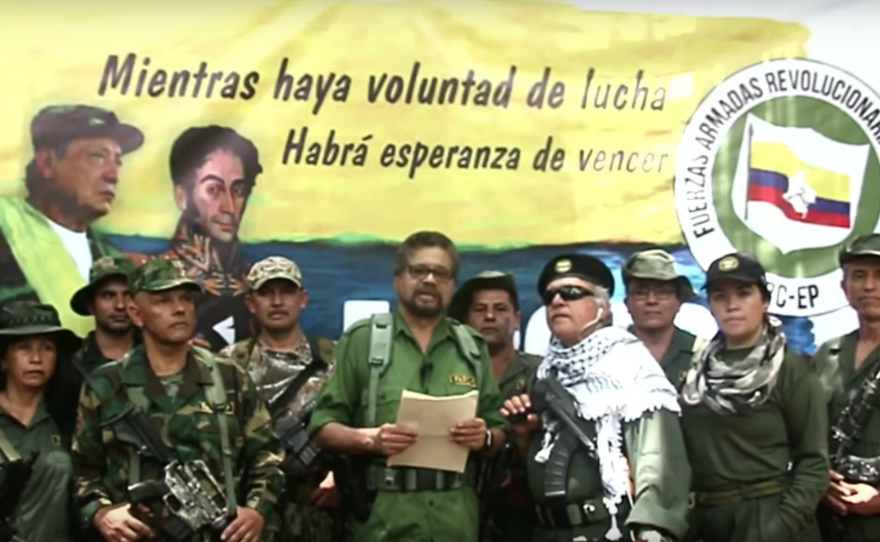Updated at 9:25 p.m. ET
Top rebels from the Revolutionary Armed Forces of Colombia have announced a "new stage of fighting," despite a peace accord that the leftist guerrilla group signed with the national government almost three years ago.
In a 32-minute YouTube video posted Thursday, more than 20 armed fighters stood in green fatigues and in front of a sign that read, "As long as there is a will to fight there will be hope for victory."
A guerrilla leader involved in the peace negotiations accused the government of betraying key components of the deal. "The state has not fulfilled its most important obligation, which is to guarantee the life of its citizens and especially avoid assassinations for political reasons," said Luciano Marin, known widely by his nom de guerre, Iván Márquez.
Under the peace treaty, thousands of Marxist- and Leninist-inspired guerrillas gave up their arms in exchange for the Colombian government's commitment to protecting them and to building infrastructure in poor, isolated communities in the countryside. In May, Marin said that it was a mistake for FARC fighters to surrender their weapons without first getting guarantees.
Colombia's peace tribunal has ordered the arrest of rebel leaders in the video.
In the video, which appeared to be filmed in the jungle, Marin said the group planned to work with the National Liberation Army (ELN), another leftist guerrilla army which has resorted to kidnapping, extortion and violence.
Hours later, an ELN leader embraced the announcement. "Better late than never," Omar Gómez, known as Uriel, said through a face mask after giving a thumbs up and a clenched fist.
Former FARC commander Rodrigo Londoño, now the president of Colombia's Revolutionary Alternative Common Force political party, reiterated his commitment to the peace accord. He said on Thursday that the majority support working toward peace. "Now more than ever, our commitment as a majority, as a party, as a country, is to peace, defending and complying with the agreement," he said. "Anyone who strays away from peace is mistaken, as those who have always attacked it."
Negotiations to end Colombia's longest war, tracing back to the 1960s, started in 2012. Former President Juan Manuel Santos and Londoño signed a peace agreement in 2016. The move triggered a new wave of violence from armed groups that fought to take control of the FARC's territory, displacing thousands in rural communities. Colombians, in a narrow margin, had previously voted to reject a peace deal.
Last year, Colombians elected President Iván Duque, who campaigned on a promise to revise the controversial peace deal. A conservative populist, he said the agreement was too lenient for rebels who had kidnapped Colombian citizens and committed other atrocities. He vowed to make "war victims the focal point of the peace process."
Since taking office, he's been accused of not just slowing down peace reforms but muddling significant facets of the agreement — especially tribunals that would allow insurgents to testify under broad immunity.
"We cannot be stupid enough to think that ... the government is an ally for peace," Naryi Vargas, a researcher at the Peace and Reconciliation Foundation, an organization based in Colombia, tweeted Thursday.
Bogota-based activist Luis Ernesto Gómez blamed Duque and former Colombian President Álvaro Uribe for FARC's announcement. "Their political calculations and systematic sabotage of the Peace Process robbed us of a golden opportunity to stop killing each other and start making progress."
The 52-year war waged by FARC left at least 220,000 people dead.
Duque has not publicly responded to the FARC video, and the Colombian Embassy in the United States did not immediately respond to NPR's request for comment.
Copyright 2019 NPR. To see more, visit https://www.npr.org.






